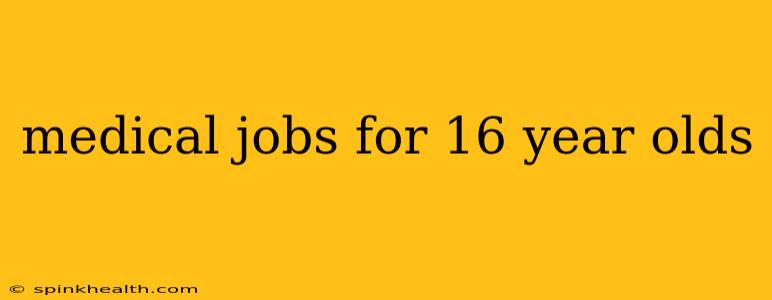The world of medicine is vast and fascinating, filled with opportunities to help others and make a real difference. For many, the desire to pursue a medical career begins early, sparking a curiosity about how the human body works and a passion for providing care. If you're 16 and eager to start your journey in the medical field, you might be surprised by the number of entry-level positions available. This isn't about performing surgery, of course, but it's about gaining valuable experience and discovering your niche within healthcare. Let's explore some possibilities.
What Medical Jobs Can a 16-Year-Old Get?
Landing a "medical" job at 16 often involves roles supporting the healthcare system rather than direct patient care. Think of it as building a strong foundation for your future ambitions. Many options exist, depending on your interests and local regulations.
Certified Nursing Assistant (CNA) - Is it Possible at 16?
This is a common question, and the answer is nuanced. While the legal age requirement for becoming a Certified Nursing Assistant (CNA) varies by state, it's often 18. However, some states might allow enrollment in a CNA program at 16, although certification might need to wait until you turn 18. It's crucial to check your state's specific regulations.
Medical Administrative Assistant/Receptionist
Many medical offices, clinics, and hospitals hire individuals for administrative roles. These positions involve answering phones, scheduling appointments, managing patient records (often using electronic health records or EHRs), and handling insurance paperwork. While the work isn't directly patient-facing, it's vital to the smooth functioning of any medical facility. This can be a great way to learn the administrative side of healthcare.
Medical Transcriptionist (Remote Possibilities)
With the advancement of technology, medical transcription can be done remotely. Some companies may hire individuals as young as 16, depending on their experience with typing and medical terminology. This requires excellent typing skills, attention to detail, and a strong understanding of medical vocabulary. Online courses can help build the necessary skills.
Volunteer Opportunities in Hospitals and Clinics
Volunteering is an excellent way to gain firsthand experience in a medical setting. Hospitals and clinics often have volunteer programs for teenagers, involving tasks like assisting patients, delivering supplies, or helping with administrative duties. These opportunities provide invaluable insight into the healthcare environment, build your resume, and allow you to network with professionals.
Pharmacy Technician (Age Restrictions Apply)
Similar to CNA positions, age restrictions apply to becoming a certified pharmacy technician. However, some pharmacies may offer entry-level roles such as stocking shelves or assisting customers, even if they can't yet be a certified technician. Again, check with your local pharmacies regarding age requirements.
What Skills Are Important for Medical Jobs at 16?
Regardless of the specific role, certain soft skills are invaluable. These transferable skills are highly sought after in any profession:
- Strong Work Ethic: Punctuality, reliability, and a willingness to learn are crucial.
- Communication Skills: Effective communication, both written and verbal, is essential, especially when interacting with patients or colleagues.
- Attention to Detail: Accuracy is critical in many healthcare settings.
- Teamwork: Most medical jobs involve collaborating with others.
- Problem-Solving Skills: Being able to think critically and adapt to changing situations is a valuable asset.
- Empathy and Compassion: A genuine care for others is often essential, particularly in patient-facing roles.
How Can I Find Medical Jobs for 16-Year-Olds?
Your search will involve a combination of online job boards, local networking, and direct applications.
- Online Job Boards: Websites like Indeed, Monster, and LinkedIn often list entry-level positions. Be sure to filter your searches by "teen jobs" or "entry-level."
- Local Networking: Talk to your school counselor, family doctor, or other healthcare professionals in your network. They might have leads on available opportunities.
- Direct Applications: Don't hesitate to apply directly to hospitals, clinics, and pharmacies in your area. Many smaller practices might have opportunities not widely advertised.
What if I Want to Be a Doctor?
If your ultimate goal is to become a physician, these early experiences will be incredibly valuable. They provide a taste of the healthcare world, build essential skills, and help you clarify your career path. Remember to focus on academics, particularly science courses, to prepare for medical school applications down the line.
Your journey to a career in medicine begins with these first steps. Seize every opportunity to learn, grow, and discover your place within the rewarding world of healthcare. Remember to check local age requirements and regulations for each position before applying.

